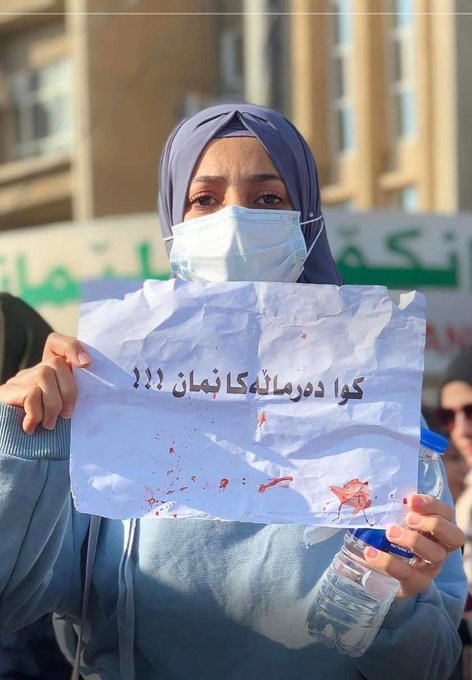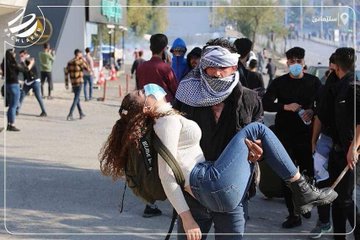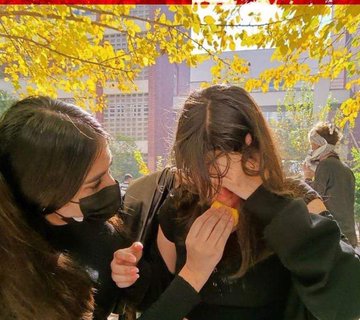Thursday, November 25, 2021. A US veteran is dead and it's not because he's crazy but it may because the system failed him, protests continue in Iraq, the Australian government tells the world to please abuse Australian citizens, and much more.
Rose L. Thayer (STARS AND STRIPES) reports:
Ian Fishback, a former Army officer who in 2005 raised concerns about the treatment of detainees in the Global War on Terror, died Nov. 19 at an adult treatment facility in Michigan. He was 42 years old.
In a statement posted with Fishback’s obituary, the veteran’s family thanked his hometown community in Newberry, Mich., for the support provided Fishback in “recent difficult times.”
“He faced many challenges and many of us felt helpless. We tried to get him the help he needed. It appears the system failed him utterly and tragically. There are many questions surrounding his death and the official cause of death is unknown at this time. We can assure you that we will get to the bottom of this. We will seek justice for Ian, because justice is what mattered most to him,” according to the statement.
Fishback’s mental health had declined recently and he struggled to get access to medical and mental health care from Veterans Affairs, said his longtime friend Justin Ford.
For those who knew Fishback, his friend said that his actions regarding the inhumane treatment of detainees came as no surprise. He always had a strong moral and ethical compass and held tightly to those principles, Ford said.
“Standing up for what you believe in is never easy. And it wasn't easy on him,” he said. “He paid a price.”
THE NEW YORK TIMES had a story on Ian Fishback. We didn't note it.
Ian Firshback did something heroic when others didn't. He could have looked the other way, as many did. He could have focused on something else. But he knew right from wrong and was raised to stand up for what was right.
To me, THE TIMES story read like 'crazy man kills himself -- more mental illness help needed at VA.'
He wasn't crazy.
I don't know that you could even call him mentally ill. And be careful with that term if your goal is to help veterans. Don't just apply it because you survived viewing a season of Jerry Springer programs and you think that's the equivalent of a hospital residency.
We say "Post-Traumatic Stress" here and we have used that forever. That condition is a coping condition. You are in volatile and violent environment and your body and your mind respond by making you hyper-vigilant. A veteran with PTS has a coping mechanism and now that she or he is back in civilian life, they need some help adjusting, re-orienting their body, mind and soul to a calmer world that they do not have to be hyper-vigilant in order to protect themselves and others.
When you stigmatize something, you make it harder for people who need some coaching, counseling or assistance to get it. Retired Gen Peter Chiarelli got that and was part of the move towards changing the term to PTS.
"Disorder" at the end of that is a shaming term that will result in fewer service members and veterans seeking assistance.
Words do matter. And THE NEW YORK TIMES report was appalling.
Crazy man kills himself -- more money to VA so the crazies can help!
That is how it read.
A brave person did a heroic thing. It wasn't easy to do it at the start and you can be sure it was hard to live with. Revealing what was happening didn't undo the damage. It didn't undo what was done -- those tortured were not magically untortured. And the horror that Ian felt that moved him to expose what was happening remained inside him.
That's sadly very normal. No one should have that in their head. We would all struggle with that. It is normal. We recoil from horrors for a reason.
The system clearly failed Ian. But Ian wasn't crazy. He was sent by our government into a war and he experienced very troubling things as a result. You go deep diving, you need to decompress. You experience what Ian did, you need something more than, "Thanks for your service."
And to be really clear, I'm not advocating for returning service members to be kept in some sort of isolation for weeks. When they return, they should be able to return to their loved ones. I am saying that services need to be made available. That's counseling with trained medical professionals, absolutely. That's also religious counseling -- that's chaplains and others. There should be a huge range of people to talk to and you should be encouraged to check in with some of the resources available.
If a veteran is feeling suicidal, it is great that there's a toll free number where they can serve assistance -- 800-273-8255 -- and it's sad that Eric Shinseki's family worked to make the use of that number questionable. But that the service is so needed goes to the fact that there are so many gaps in care.
And there were way too many gaps on the part of the US government with regards to Ian. He was abandoned in many ways.
He did a heroic and courageous thing. The US government did not honor that action.
There needs to be an award for people who show true courage and character by coming forward like he did. He received no special decoration from the US government. If he had, that could have eased some of his stress. If the government had officially recognized the strength of his actions, that could have made a real difference.
In Iraq, protests continue:
Ayub Zangana Tweets:
The protests, in principle to ask that scholarships be restored to university students, highlight the economic crisis that the autonomous government is going through. Significantly, 80% of Iraqis trying to reach the European Union from Belarus come from this region of northern Iraq.
In view of the complaints, the Kurdistan regional government has decided to allocate a budget to help students of universities and institutes, according to an official spokesperson quoted by the information network Esta. It is not clear if that promise will be enough to calm the spirits of young Kurds, whose protests have been harshly repressed according to local media.
The Kurdistan government suspended student stipends in 2015, due to the economic crisis caused by falling oil prices, the fight against the so-called Islamic State and the wave of internally displaced people who arrived from other areas of the country. Until then, university and high school students received between 30,000 and 100,000 Iraqi dinars (between 18 and 61 euros) a month. Now, young people consider that the circumstances that led to the interruption of aid have already been overcome.
Half a dozen men, some of them heavily armed, wrestle a young man to the
ground where one of the men kicks him hard in the head. The young man
is then hauled to his feet and led away, all the while taking blows from
the men’s fists. This is the scene in a video that appears to have been shot from a nearby rooftop during a student protest in Sulaimani. The clip sparked outrage online.
The protests began on Sunday at the University of Sulaimani and were met
with a crackdown as police used electric batons to disperse the crowd.
But the protests have continued, growing in size every day and spreading to other cities and towns across the Kurdistan Region.
The internal security forces (Asayish) issued a statement on Wednesday
about the video “in which someone hurts a protester in an illegal and
inappropriate way.” They said they have made an arrest in connection
with the incident.
The protests began with students demanding restoration of a living
allowance. The government used to pay a monthly stipend of 40,000 to
100,000 dinars ($27 - $67) per student. It was one of the expenses the
government cut when it introduced austerity measures like salary cuts to
cope with the financial crisis caused by the war with the Islamic State
(ISIS), low oil prices, and budget disputes with Baghdad. Without the
funds, some students have problems buying food or paying for
accommodation.
But the allowance is just the start of a long list of grievances.
“The allowances was basically the match that starts the fire. We are
demanding better services. We are demanding the removal of political
influence from university affairs. We are demanding a better education
system,” Ahmed*, one of the protesters, told Rudaw English on
Wednesday.
Student representatives on university councils are often picked based on
their affiliation with political parties. Classes are often overcrowded
or frequently interrupted because teachers go on strike over unpaid
salaries.
In Iraq -- yes, even in the KRG -- the government response is always to attempt attacks on reporters to discourage coverage. Again, even in the KRG this happens:
AL-AHAD TV notes:
The 'brave' Kurdish forces are attacking reporters and they're attacking students. This is outrageous. Where are the Barzanis and the Talabanis -- the two Kurdish family dynasties? Why aren't they publicly speaking up? Because they're in charge of the government and they approve of these actions?
Actions like the ones Nozheen Murad notes below:
I thought Hiro Talabani was many things. I did not think she was stupid until right now. Is there a reason she hasn't deployed all her sons in front of TV cameras to denounce what's going on? To pin it on the Barzanis? That would elevate her family. Not much else will at this point. I thought she was smart enough to seize every opportunity. Guess not. Or maybe her sons are all in the US right now?
As for the Barzanis, they need to grasp that the Talabanis rode high for years and didn't think that would ever end. It has ended. Election after election demonstrates that. And that could easily be the Barzanis fate next if they don't start addressing real concerns and stop using security forces to threaten and abuse the people.
Speaking of failed governments, will Australia ever defend their own citizens? They refuse to stand by journalist Julian Assange who remains threatened and abused by the US and UK governments. In addition, they refuse to defend another citizen who's being held in an Iraqi prison. Christopher Knaus (GUARDIAN) reports:
Australian engineer Robert Pether has penned a handwritten note to Scott Morrison from his Iraqi jail cell, pleading for the prime minister to intervene and warning he is effectively being held hostage.
Pether has been behind bars for almost eight months after being lured to Iraq and arrested in relation to a dispute between his firm and the Central Bank of Iraq over the construction of its new Baghdad headquarters.
In August, Pether was sentenced to five years in an Iraqi jail and fined $US12m over allegations his firm, CME Consulting, spent money that should have gone to an architect and a subcontractor.
The sentence devastated his Ireland-based family, including his wife, Desree, and three children, who say Pether has been punished for what is effectively a contractual dispute that belongs in civil courts.
Pether said he’d been tricked into signing a confession – written in Arabic – in front of a judge after being told it was a routine court record.
“Two months later I learned the document was my alleged confession,” he wrote. “The first time I saw a translation of this document was four months after this date and it was nothing like the statement I had given during the interrogation process.”
Australia's 60 MINUTES filed a report a few weeks ago.
Winding down, yesterday's snapshot noted Hunter Biden's latest scandal. Yesterday evening, a friend told me Jonathan Turley had weighed in. We had problems yesterday getting the snapshot up so I missed that -- I did go in an add a note and a link. If you missed his column, here's the opening:
I previously wrote a column on the one year anniversary of the Hunter Biden laptop story that marveled at the success of the Biden family in making the scandal vanish before that 2020 election. It was analogized to Houdini making his 10,000-pound elephant Jennie disappear in his act. The Biden trick however occurred live before an audience of millions. Now, in an encore, a new major story on Biden’s Chinese dealings has surfaced. Once again, poof!
The media has made the story disappear except for a couple of the usual outlets. Even with the New York Times reporting on the story, the disclosure of Biden’s role in securing one of the world’s largest cobalt mines for China (a key component to electric battery production) has been ignored by the major networks and many other print outlets. Once again, ABC. NBC, CBS, CNN, MSNBC, and other media just cannot see the elephant.
What is most amazing about this continuing trick is that the story has all of the elements that the media longed to confirm during the Trump Administration on the financial dealings of the Trump children. The son of the President was involved in a successful effort to handover a strategically vital natural resource to the Chinese that would guarantee their dominance in one of the most important new industries of the “Green economy.” This occurred during a period when Hunter Biden and his uncle were accused of running a global influence peddling operation with foreign powers that cashed in on the Vice Presidency of Joe Biden. Then there is the fact that the story appears to contradict denials of continuing ownership in such foreign interests by the Bidens.








